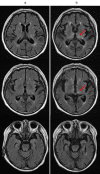Early detection of thiamine deficiency by non-thyroidal illness syndrome in a hemodialysis patient
- PMID: 36018508
- PMCID: PMC9892385
- DOI: 10.1007/s13730-022-00729-8
Early detection of thiamine deficiency by non-thyroidal illness syndrome in a hemodialysis patient
Abstract
An 88-year-old male patient on maintenance hemodialysis (HD) therapy experienced gradual losses in appetite and liveliness during the course of 1 month. Physical examinations revealed no abnormalities. However, blood testing indicated non-thyroidal illness syndrome (NTIS) typically observed in patients with severe illness, with serum levels of thyroid stimulating hormone, free triiodothyronine, and free thyroxine of 0.17 μIU/mL, < 1.0 pg/mL, and 0.23 ng/dL, respectively. Brain magnetic resonance imaging to exclude the possibility of central hypothyroidism unexpectedly displayed slight abnormalities inside of the thalami that were characteristic of Wernicke's encephalopathy. Additional examination disclosed low serum thiamine of 20 ng/mL. Thiamine injections of 100 mg at every HD treatment rapidly restored his appetite, liveliness, and NTIS findings. HD patients are at a particularly high risk of thiamine deficiency (TD) and associated severe symptoms due to losses of thiamine during HD sessions. However, its non-specific initial symptoms, including decreases in appetite and liveliness, as well as undetectability in routine blood tests complicate early detection, resulting in underdiagnosis and more severe outcomes. In the present case, TD manifested only as non-specific symptoms and was ultimately revealed by the presence of NTIS, which was resolved with thiamine supplementation. Thus, NTIS might assist in the early detection of TD as an initial sign in HD patients.
Keywords: End-stage renal disease; Hemodialysis; Non-thyroidal illness syndrome; Thiamine deficiency.
© 2022. The Author(s) under exclusive licence to The Japan Society of Nephrology.
Conflict of interest statement
The authors have declared that no conflict of interest exists.
Figures


Similar articles
-
Severe thiamine deficiency resulted in Wernicke's encephalopathy in a chronic dialysis patient.Clin Exp Nephrol. 2006 Dec;10(4):290-3. doi: 10.1007/s10157-006-0440-9. Epub 2006 Dec 20. Clin Exp Nephrol. 2006. PMID: 17186335
-
Outbreak of life-threatening thiamine deficiency in infants in Israel caused by a defective soy-based formula.Pediatrics. 2005 Feb;115(2):e233-8. doi: 10.1542/peds.2004-1255. Pediatrics. 2005. PMID: 15687431
-
Palliative treatment of thiamine-related encephalopathy (Wernicke's encephalopathy) in cancer: A case series and review of the literature.Palliat Support Care. 2015 Oct;13(5):1241-9. doi: 10.1017/S1478951514001163. Epub 2014 Oct 23. Palliat Support Care. 2015. PMID: 25339378 Free PMC article. Review.
-
[Wernicke's encephalopathy as a complication of chronic hemodialysis: report of one case].Rev Med Chil. 1997 May;125(5):582-5. Rev Med Chil. 1997. PMID: 9497581 Spanish.
-
Wernicke's encephalopathy associated with hemodialysis: report of two cases and review of the literature.Clin Neurol Neurosurg. 1999 Jun;101(2):118-21. doi: 10.1016/s0303-8467(99)00014-1. Clin Neurol Neurosurg. 1999. PMID: 10467908 Review.
References
Publication types
MeSH terms
Substances
LinkOut - more resources
Full Text Sources

